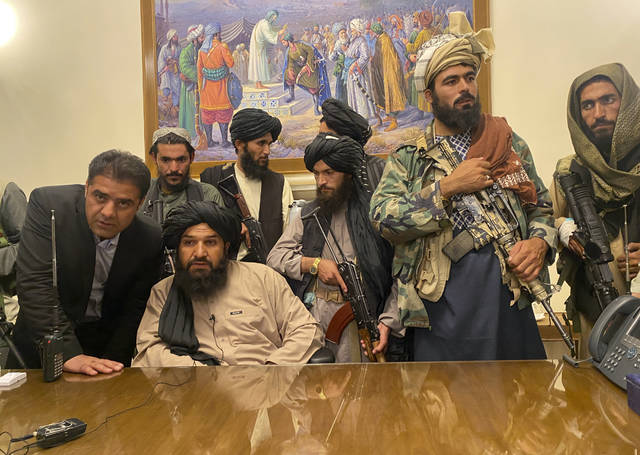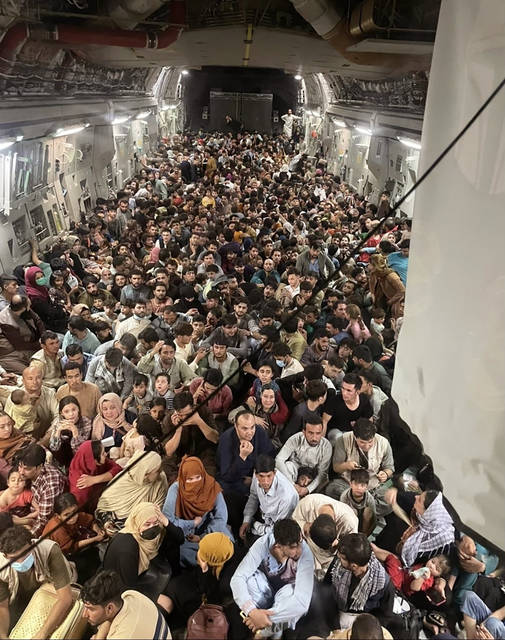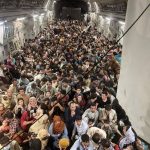The Taliban is urging Afghans to stay in Afghanistan.
The new rulers of the country are promising an “inclusive government” and opportunities for women (within Islamic sharia law). But can the radical Islamist group be trusted to keep its word?
Based on the chaos at Kabul’s international airport, with thousands of Afghans desperate to get out of the country, many are skeptical of these promises. What is the U.S. government’s obligation when it comes to getting people out of Afghanistan?
The Tribune-Review posed these questions and more to Colin P. Clarke, director of policy and research for The Soufan Group, a global intelligence and security consultancy. Clarke, a Mt. Lebanon resident, holds a Ph.D. from the University of Pittsburgh and worked in the Pittsburgh office of RAND Corp. for a decade. He spent three months in Afghanistan in 2011 on a counter-corruption task force under the supervision of Lt. Gen. H.R. McMaster.
Question: Should anyone trust these promises from the Taliban?
Answer: Absolutely not. This is a bloodthirsty, fundamentalist organization, just evidenced by the way it behaves on the ground. It subjugates women, it slaughters civilians. So, that’s a clear and unequivocal, no.
They are quite media savvy, but really what we are seeing over the past week is nothing more than a public relations job.
Q: Is there any indication things will be different today for Afghan people living under Taliban rule than they were 20 years ago, before U.S. troops went in there?
A: There may be some differences and that’s because this is a different generation of Afghans. They’ve grown up with different technologies – access to the internet and cellphones. Women have made significant strides in that country and in that society.
So, a lot of these newfound rights will be rolled back. Will they be erased completely? That’s yet to be seen. I think the Taliban is quite aware that the international community is watching closely.
I think, frankly, their plan is the same as what it was for peace negotiations with the United States — which is just to wait everyone out. They’ll wait until the next global crisis takes place, then they’ll go back to ruling the only way they know how, the only way they prefer to, which is with an iron fist.
Q: U.S. intelligence agencies warned earlier this summer that Afghan forces could rapidly collapse, despite President Biden saying a total Taliban takeover was unlikely. How did the president end up misreading this situation so badly?
A: That’s the million-dollar question everybody is trying to get at right now. What assessments was the president seeing that others weren’t? And what assessments was the intelligence community seeing that the president wasn’t? A clear disconnect, we know that. Now it comes down to figuring out how the administration could have gotten this so wrong.
Q: President Biden spoke Monday and said the Afghan government was going to collapse eventually anyway, that government forces didn’t have the will to make a fight and America can’t keep propping them up. Does he have a point here?
A: You’d have to ask the tens of thousands of Afghan soldiers that died fighting for their country. To say they didn’t have the will to fight seems a bit inaccurate.
There are a lot of factors that led to what we’re seeing over the past week and it’s really complex. We’ve been in this country now for two decades. A lot has gone on — some of it our fault and some of it not. I’ve seen some analysts say that we created a dependency — that the Afghans depended on us too much. Or that we engaged in mirror-imaging where we attempted to create the Afghan national security force in the image of the U.S. military and that was a bar that was too high.
I think there’s going to be a lot soul-searching in the coming weeks and months trying to get to the bottom of just exactly what went wrong. But my sense is it’s probably a dozen factors that all coalesced to lead us to the situation we’re in now.
Q: U.S. forces went into Afghanistan 20 years ago because the 9/11 attacks were launched from there by al-Qaida. With U.S. forces gone, what are the chances of that happening again?
A: I don’t think we’re likely to see a 9/11-style attack again just because the bar is so high. That was an extremely complex attack with over a dozen individuals taking part in it. I do think al-Qaida will regenerate its networks within Afghanistan and will certainly seek to regrow its external operations planning capabilities.
I think we could see something like the Islamic State attacks in Paris in November 2015 and Brussels in 2016, or even going back further to plots (related to al-Qaida) like we saw in Madrid in 2004 or London in 2005. Those are the types of attacks I would expect al-Qaida to attempt to mount.
Q: We’ve seen the images of the chaos at the airport in Kabul. What is the U.S. government obligated to do when it comes to getting people out of Afghanistan?
A: I think the U.S. government is obligated to stick to its promises. If the U.S. government said it would get Afghans out who worked with the United States, it should do exactly that and it shouldn’t cut corners there. We’re already dealing with a major blow to our credibility on the international stage based on the way that this withdrawal was executed.
It’s been a debacle. I think we have a great responsibility to take care of people who helped us throughout these last two decades.











